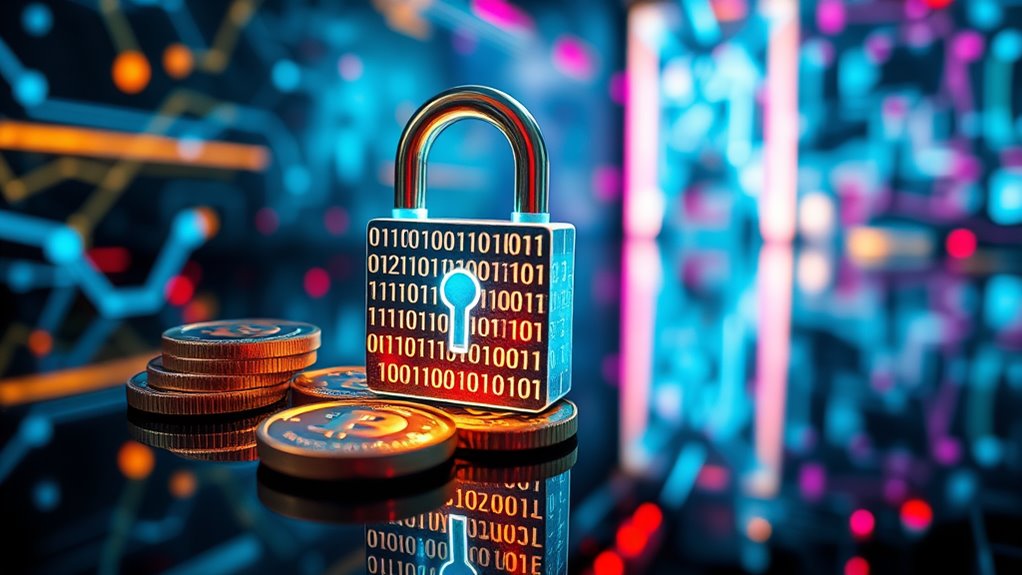
DeFi Security: Top Trends to Safeguard Your Assets
DeFi security continues evolving with several key trends. Regulatory frameworks like MiCA and DORA establish clearer standards for providers. Hardware wallets and cold storage offer essential physical barriers against digital threats. AI-driven smart contract auditing detects vulnerabilities with increased accuracy. Multi-signature access controls require multiple approvals for transactions. Zero-knowledge proofs protect user privacy while maintaining compliance. DeFi insurance provides coverage against hacks and operational failures. These protection measures form a thorough security approach for the cautious investor.
Key Takeaways
- Hardware wallets and cold storage provide offline protection against digital threats by storing private keys in secure environments.
- Multi-signature access controls require multiple approvals for transactions, preventing unilateral fund movement and enhancing security.
- AI-driven smart contract auditing identifies vulnerabilities with superior speed and accuracy compared to human auditors.
- Zero-knowledge proofs enable transaction verification without exposing personal information, balancing privacy with regulatory compliance.
- DeFi insurance offers protection against hacks and operational failures through decentralized underwriting and automated claims processing.
The Rise of MiCA and DORA Compliance in DeFi Security

As decentralized finance continues to evolve across global markets, regulatory frameworks like MiCA and DORA have emerged as critical components shaping the future of DeFi security.
MiCA establishes uniform standards for crypto-asset service providers, emphasizing investor protection through licensing requirements and operational transparency.
MiCA’s standardization framework ensures investor safety through rigorous licensing and transparency measures for crypto service providers.
Meanwhile, DORA strengthens platforms’ resilience against digital threats by mandating thorough ICT risk management frameworks and incident reporting protocols.
For DeFi projects, compliance with these regulations offers substantial benefits despite implementation challenges.
Early adopters gain competitive advantages through enhanced institutional trust and user confidence.
While small players may face operational hurdles, regulatory clarity ultimately facilitates sustainable growth by transforming DeFi from a speculative environment to a mature market ecosystem with standardized security practices across EU member states.
Moreover, the need for international cooperation among regulators is crucial in addressing the complexities of compliance and security in the rapidly evolving DeFi landscape.
Hardware Wallets and Cold Storage: First Line of Defense

Hardware wallets represent a critical physical barrier against digital threats by separating cryptographic keys from internet-connected devices.
The physical verification requirement prevents remote attackers from executing unauthorized transactions, while providing concrete confirmation of transaction details before approval.
Multi-signature setups enhance this security framework further by requiring multiple authorized approvals before funds can be moved, effectively distributing risk across separate devices or individuals. Additionally, using secure backups stored in multiple locations can provide an extra layer of protection against potential loss or theft of your crypto assets.
Physical Security Benefits
The foundation of robust DeFi security begins with physical security measures that keep digital assets isolated from online threats. Hardware wallets represent the gold standard in this approach, storing private keys in secure offline environments that are inaccessible to remote attackers.
These devices offer multi-layered protection through features like PIN authentication, transaction verification screens, and tamper-evident packaging. By displaying transaction details directly on the device, hardware wallets effectively neutralize phishing attempts and malicious software.
Users also maintain complete control over their assets, eliminating risks associated with exchange insolvencies or third-party vulnerabilities. This approach is particularly valuable for long-term storage, as offline solutions dramatically reduce exposure to hacking attempts. Additionally, keeping software and apps up to date is essential to ensure that users benefit from the latest security patches.
When selecting a hardware wallet, users should evaluate compatibility with their preferred cryptocurrencies, security certifications, and the manufacturer’s reputation.
Multi-Signature Setup Advantages
While hardware wallets offer robust individual protection, multi-signature setups elevate security to institutional-grade levels by distributing control across multiple verification points. These systems require multiple approvals for each transaction, markedly reducing unauthorized access risks while enabling customizable security thresholds.
Organizations benefit from multi-signature implementations through:
- Collaborative governance that guarantees financial decisions require consensus
- Enhanced fraud prevention by distributing signing authority among different parties
- Reliable recovery options if individual keys are compromised or lost
- Clear audit trails that increase transparency and accountability
This approach integrates seamlessly with hardware wallets and cold storage solutions, creating layered protection ideal for managing substantial cryptocurrency holdings. Additionally, adopting DeFi wallets allows users to engage with decentralized applications while maintaining control over their private keys.
For enterprises handling large assets, the combination of multi-signature requirements with offline storage represents the current gold standard in DeFi security infrastructure.
AI-Driven Smart Contract Auditing: The New Standard

Modern DeFi protocols increasingly rely on AI-driven smart contract auditing to safeguard their digital assets.
These automated systems analyze code with superior speed and accuracy compared to traditional manual reviews, identifying vulnerabilities that human auditors might miss.
AI audits offer significant advantages in the rapidly evolving blockchain ecosystem, including cost-effectiveness, scalability, and continuous monitoring.
Machine learning algorithms detect patterns in code, automatically flagging potential security issues while adapting to emerging threats in real-time.
This approach enables protocols to deploy smart contracts faster without compromising security.
The technology leverages advanced techniques such as natural language processing and dynamic analysis, which simulates attack scenarios to test contract resilience.
As DeFi continues to expand, AI-powered security solutions have become essential for protecting billions in digital assets from exploitation. Moreover, the integration of cross-chain interoperability is expected to further enhance security measures by facilitating collaborative defense mechanisms across multiple blockchain platforms.
Cross-Chain Security Protocols for Asset Protection

Cross-chain security protocols have emerged as an indispensable layer of protection in the evolving DeFi landscape, complementing AI-driven smart contract auditing with specialized safeguards for inter-blockchain transactions.
These protocols facilitate secure asset transfers between different blockchain networks while mitigating unique risks associated with cross-chain operations.
Key security measures include:
- Cross-chain bridges that lock assets on the origin chain before minting equivalent tokens on the destination chain
- Decentralized mechanisms that eliminate reliance on centralized exchanges, reducing hacking risks
- Smart contract segmentation across multiple blockchains to enhance security architecture
- Continuous auditing processes to identify vulnerabilities in cross-chain interactions
As interoperability continues to advance, protocols like Chainlink CCIP and Avalanche-X Framework provide robust frameworks for maintaining asset integrity while enabling the benefits of cross-chain liquidity and diversification. Additionally, decentralized finance (DeFi) aims to democratize access to financial services, which highlights the importance of implementing strong security measures.
Institutional-Grade Security Features Entering Retail DeFi

Institutional-grade security features, once exclusive to large financial organizations, are now making their way into retail DeFi platforms to protect everyday users.
Multi-signature access controls require multiple approvals for transactions, greatly reducing the risk of unauthorized access and providing retail users with enterprise-level protection.
Zero-knowledge proofs and institutional custody solutions are similarly transforming retail DeFi security, allowing users to verify transactions without revealing sensitive information and benefiting from the same robust asset protection standards previously available only to major financial institutions. Additionally, Decentralized Autonomous Organizations are leveraging these security features to enhance transparency and trust among their members.
Multi-Sig Access Controls
Security evolution in the DeFi space has witnessed the migration of multi-signature wallets from exclusive institutional environments to everyday retail applications.
These advanced security frameworks require multiple private keys to authorize transactions, greatly reducing single points of failure while enhancing protection against unauthorized access.
Multi-sig systems offer several critical benefits to DeFi users:
- Collective decision-making, preventing unilateral fund movement
- Enhanced protection against exit scams through distributed authorization
- Flexible signature threshold configurations (2-of-3, 3-of-5, etc.)
- Seamless integration with hardware wallets for additional security layers
This technology proves particularly valuable for DAOs, family fund management, high-value transactions, and escrow services. As adoption increases, users gain institutional-grade security while maintaining the decentralized ethos fundamental to DeFi, though regulatory scrutiny may intensify accordingly. Furthermore, the rise of decentralized finance has prompted a broader conversation about the importance of security in financial transactions.
Zero-Knowledge Proof Implementation
While initially developed for complex cryptographic applications, zero-knowledge proofs (ZKPs) have now emerged as a transformative security technology in retail DeFi environments.
These mathematical protocols allow users to prove the validity of transactions without revealing sensitive data, greatly enhancing privacy protection.
ZKPs offer practical benefits for everyday DeFi users, including secure identity verification and transaction validation without exposing personal information.
By enabling off-chain verification processes, they also improve scalability and reduce transaction fees. Additionally, ZKPs help platforms maintain regulatory compliance while preserving the decentralized nature of DeFi.
Despite their advantages, implementing ZKPs presents technical challenges. However, their ability to protect user data while ensuring transaction integrity makes them increasingly valuable as DeFi adoption grows among retail users seeking institutional-grade security features. Furthermore, the rise of decentralized finance has created a demand for innovative security solutions like ZKPs to safeguard user assets effectively.
Institutional Custody Solutions
As financial institutions increasingly explore the DeFi landscape, sophisticated custody solutions once reserved exclusively for large enterprises are now becoming accessible to retail investors.
These custody innovations merge traditional financial security with blockchain technology, creating safer entry points for everyday users.
Key institutional-grade features filtering into retail DeFi include:
- Multi-party computation (MPC) technology that distributes private key management across multiple parties
- Hardware security modules (HSM) offering physical protection against unauthorized access
- Customizable transaction approval policies requiring multiple authorizations
- Insurance coverage protecting against hacks and operational failures
These advancements allow retail investors to participate in staking, lending, and other DeFi activities with considerably reduced risk profiles. Additionally, the rise of DeFi lending creates more opportunities for users to earn yields and secure loans through decentralized platforms.
The integration of institutional security standards represents an essential step toward mainstream DeFi adoption while addressing persistent security concerns plaguing decentralized finance.
DeFi Insurance Solutions: Beyond Smart Contract Coverage

The evolution of decentralized finance has necessitated robust insurance mechanisms that extend far beyond traditional smart contract coverage.
Modern DeFi insurance models now incorporate community-driven governance and mutual risk-sharing principles, distributing responsibility among participants while enhancing accountability.
These platforms leverage decentralized underwriting methods that utilize crowd-sourced data for accurate risk assessment.
Insurance pools aggregate funds from users, creating collective security layers, while governance tokens empower community members to participate in decision-making processes.
The automation of claims through smart contracts and oracles reduces administrative costs considerably.
Despite their benefits, these insurance solutions face challenges including smart contract vulnerabilities, market volatility, and liquidity fragmentation.
Platforms like Nexus Mutual, Cover Protocol, and InsurAce continue to innovate by offering cross-chain support and encouraging community participation in risk evaluation.
Multi-Factor Authentication and Key Management Strategies

Why do multi-factor authentication (MFA) systems represent the cornerstone of modern DeFi security architectures? As DeFi platforms manage increasing volumes of assets, traditional password protection proves inadequate against sophisticated attacks. MFA combines multiple verification methods, markedly enhancing security while maintaining accessibility.
Effective MFA implementation in DeFi environments requires:
- Utilizing hardware wallets for offline private key storage
- Implementing TOTP solutions through authenticator apps
- Creating secure backup and recovery mechanisms
- Establishing regular user training programs
Key management presents unique challenges in decentralized environments, where compromise often means permanent asset loss.
Secure database integration for MFA data storage and thoughtful implementation of segmented security policies across user roles can mitigate these risks. As the sector evolves, AI-driven threat detection and blockchain-based solutions are emerging as promising security innovations.
Frequently Asked Questions
How Do Decentralized Identity Solutions Enhance Defi Security?
Decentralized identity solutions enhance DeFi security by giving users control over personal data, reducing identity theft risks, enabling selective information sharing, and supporting compliance while maintaining privacy through technologies like zero-knowledge proofs and verifiable credentials.
What Security Risks Do Flash Loans Pose to Defi Protocols?
Like a double-edged sword that both cuts and protects, flash loans present significant risks through price manipulation, smart contract exploitation, arbitrage attacks, and oracle manipulation, enabling attackers to execute complex exploits without financial risk.
How Can Algorithmic Stablecoins Affect Overall Defi Ecosystem Security?
Algorithmic stablecoins can introduce systemic vulnerabilities to DeFi, as their price instability during market stress may trigger liquidation cascades. Their reliance on complex smart contracts also expands the attack surface for potential exploits.
What Role Does Token Governance Play in Defi Security?
With over 70% of DeFi hacks occurring in projects with centralized governance, token governance enhances security by distributing decision-making power, implementing timelocks on protocol changes, and aligning stakeholder incentives with platform security outcomes.
How Do Privacy-Focused Defi Solutions Balance Transparency With Security?
Privacy-focused DeFi solutions employ technologies like zero-knowledge proofs and homomorphic encryption to verify transactions without exposing sensitive data, while selective disclosure mechanisms enable regulatory compliance without compromising the overall security and confidentiality of users’ financial activities.
Conclusion
As DeFi continues its march into the financial mainstream, security stands as both shield and cornerstone. Like a digital fortress constantly reinforcing its walls, the ecosystem evolves through regulatory frameworks, hardware innovations, and AI-powered protections. For investors steering through these digital waters, implementing layered security strategies—from cold storage to cross-chain protocols—isn’t merely advisable but essential. The future of DeFi belongs to those who prioritize security as vigilantly as profits.














